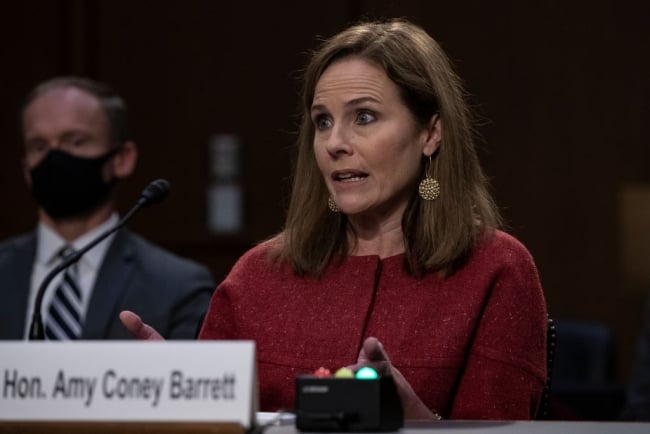You have /5 articles left.
Sign up for a free account or log in.

Supreme Court nominee Judge Amy Coney Barrett
Getty Images News
As Amy Coney Barrett was undergoing hours of questioning Tuesday, on the second day of her confirmation hearing for appointment to the Supreme Court, more than 100 faculty members back at the University at Notre Dame, where she had been a law professor for 20 years, were signing an online letter opposing her appointment.
The petition drive came a day after retired Notre Dame law school dean Patricia O’Hara introduced Barrett before the Senate Judiciary Committee Monday as “an exceptional teacher and superb scholar.” Notre Dame’s president, the Reverend John Jenkins, while not wearing a mask, also attended the ceremony at the White House’s Rose Garden two weeks ago where President Trump announced his nomination of Barrett to the court.
The letter, in part, was meant to make the point that not all of Barrett’s former colleagues at the university support her appointment to the court, said Kristin Shrader-Frechette, a Notre Dame biological sciences professor who organized the petition with three other university professors.
“By attending the Rose Garden event -- which was difficult to distinguish from a political campaign rally -- President Jenkins and others from Notre Dame may have inadvertently created the impression that Notre Dame is officially endorsing the actions of Donald Trump and the appointment of Amy Barrett,” said the letter, which had been signed by 133 faculty as of early Tuesday evening.
“Many members of the faculty are strongly opposed to Amy Barrett’s nomination,” the letter said. “Many of us do not know her, but she seems to be a kind, decent, and intelligent person. However, we are strongly opposed to her views -- as reflected in her writings, opinions, and dissents,” the letter said.
In addition, Shrader-Frechette said she and the other organizers -- Amitava Dutt, an economics and political science professor; Steve Fallon, a humanities and liberal sciences professor; and Jacek Furdyna, a professor in physics -- were concerned that Trump was using the presence of Father Jenkins and others from the university to boost his re-election. “The Catholic vote is up for grabs in this election,” she said, worrying that the university taking sides in the election would hurt academic freedom.
It’s not the first time those at an institution with connections to Barrett have opposed her nomination to replace the late justice Ruth Bader Ginsburg. Last month, more than 1,500 alumni of Rhodes College, the small Memphis, Tenn., institution where Barrett graduated magna cum laude with an undergraduate degree in English, signed a statement saying they are "firmly and passionately opposed to her nomination."
Barrett, who is expected to be confirmed to the court by the Senate’s Republican majority, is nevertheless facing strong opposition from Democratic senators who say that her appointment would shift the court to the right, endangering the Affordable Care Act and abortion rights. Higher education legal experts say Barrett's appointment could affect other issues involving colleges and universities, including threatening the consideration of race in admissions.
On Tuesday, however, Barrett repeatedly refused to say how she would vote in a case headed to the court that is seeking the repeal of the health-care law as unconstitutional. Barrett, who said she has given no assurances to Trump or Republican senators on how she would vote on several controversial issues, said that to take a position now would make her a “pundit” and vowed to consider cases before the court thoughtfully and in consultation with other justices.
Barrett, a Roman Catholic, also continued to insist, as she did in her opening remarks Monday, that her judicial opinions would not be colored by her personal views.
“I cannot take policy positions or express my personal views before the committee,” she told senators Tuesday, “because my personal views have nothing to do with the way I would decide cases, and I don’t want anyone to be unclear about that.”
Barrett said later, “Part of the rationale for courts adhering to the rule of law, and for judges taking great care to avoid imposing their policy preferences, is that it’s inconsistent with democracy. Nobody wants to live in a world with the law of Amy. I’m sure my own children don’t even want to do that.”
Still, Shrader-Frechette said organizers are concerned, among other things, that Barrett espouses the legal philosophy of originalism, which interprets the Constitution based on how it was viewed by those who ratified it at the time. But Shrader-Frechette said that view “will likely leave out people in our democracy,” because the framers of the Constitution did not include people of color or women.
“Our campus has many gays, and they’re worried. Our atheists are worried. Our Muslims are worried. Our Jewish faculty are worried,” she said.
Democrats also oppose letting Trump appoint Ginsburg's successor less than three weeks before voters could decide to vote him out of office. The Notre Dame faculty agreed.
"Many on the faculty are strongly opposed to the process by which Judge Barrett is being pushed through by the president and the GOP, especially on the eve of this presidential election," the letter said. "This push contradicts the arguments made by GOP senators in the past that Supreme Court judges should not be nominated just before a presidential election."




